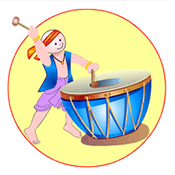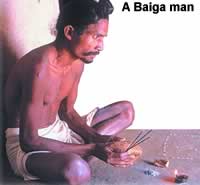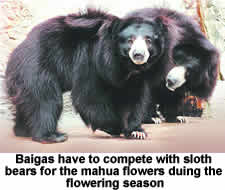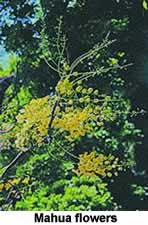
Dimdima
Online Children's Magazine from India

Dimdima
Online Children's Magazine from India

Another tribe that dwells on the banks of the Narmada are the Baigas — traditional medicine men and priests. Interestingly, not only Gonds, but non-aboriginal Hindus also use their services. No kharif sowing will begin till a Baiga priest has conducted a sacrifice.
The Baigas claim to be the oldest inhabitants of the forests, and quite separate from the Gonds. Indeed they say they are the first-born of creation or Bhumia Raja, guardians of the earth. A Baiga legend relates that the first man on earth was their ancestor Nanga Baiga who helped stabilise the wobbling world God created, by hammering four nails into the four corners. A poignant twist to this story explains their poverty: God called Nanga Baiga to give him some grain. Ashamed of his nakedness, Nanga slipped behind a pillar. He received the grain with outstretched hands. But because the pillar was in-between, he had to clutch the grain in each fist. Most of the grain fell out, which is why the Baigas still have so little.
 In the last few decades, the Baigas have been forced to abandon their traditional bewar or slash-and- burn cultivation and take to the plough. They insist that their centuries-old way of life does not destroy the environment, but rejuvenates and sustains it. Tradition forbids them from tearing the breast of Mother Earth. For this reason, Baiga men also never cut their hair, believing that it defiles the earth on which it falls. They wear it long and looped at the side of the head. They are great hunters, adept with the bow and axe, killing and eating anything that moves, including rats. Perhaps the only animals that the Baigas don’t eat are the monkey and the bear, the monkey because it resembles man and the bear because its smell is unbearable!
In the last few decades, the Baigas have been forced to abandon their traditional bewar or slash-and- burn cultivation and take to the plough. They insist that their centuries-old way of life does not destroy the environment, but rejuvenates and sustains it. Tradition forbids them from tearing the breast of Mother Earth. For this reason, Baiga men also never cut their hair, believing that it defiles the earth on which it falls. They wear it long and looped at the side of the head. They are great hunters, adept with the bow and axe, killing and eating anything that moves, including rats. Perhaps the only animals that the Baigas don’t eat are the monkey and the bear, the monkey because it resembles man and the bear because its smell is unbearable!
 The Baiga-Gond custom of tattooing still finds favour, especially among the women. The women are often tattooed from top to toe, including the forehead, neck and back of the legs. Other traditional habits which have not yet died out are the smoking of the chungi, a pipe made of green tobacco leaf, and the drinking of mahua, the liquor made from fermented flowers.
The Baiga-Gond custom of tattooing still finds favour, especially among the women. The women are often tattooed from top to toe, including the forehead, neck and back of the legs. Other traditional habits which have not yet died out are the smoking of the chungi, a pipe made of green tobacco leaf, and the drinking of mahua, the liquor made from fermented flowers.
Last updated on :12/5/2005
Dimdima is the Sanskrit word for ‘drumbeat’. In olden days, victory in battle was heralded by the beat of drums or any important news to be conveyed to the people used to be accompanied with drumbeats.
Bharatiya Vidya Bhavan
K. M Munshi Marg,
Chowpatty, Mumbai - 400 007
email : editor@dimdima.com
Bharatiya Vidya Bhavan
505, Sane Guruji Marg,
Tardeo, Mumbai - 400 034
email : promo@dimdima.com
Dimdima.com, the Children's Website of Bharatiya Vidya Bhavan launched in 2000 and came out with a Printed version of Dimdima Magazine in 2004. At present the Printed Version have more than 35,000 subscribers from India and Abroad.